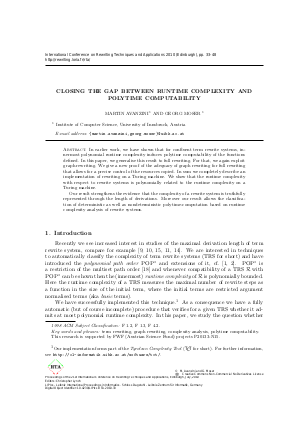Closing the Gap Between Runtime Complexity and Polytime Computability
Authors Martin Avanzini, Georg Moser
-
Part of:
Volume:
Proceedings of the 21st International Conference on Rewriting Techniques and Applications (RTA 2010)
Part of: Series: Leibniz International Proceedings in Informatics (LIPIcs)
Part of: Conference: International Conference on Rewriting Techniques and Applications (RTA) - License:
 Creative Commons Attribution-NonCommercial-NoDerivs 3.0 Unported license
Creative Commons Attribution-NonCommercial-NoDerivs 3.0 Unported license
- Publication Date: 2010-07-06
File

PDF
LIPIcs.RTA.2010.33.pdf
- Filesize: 206 kB
- 16 pages
Document Identifiers
Subject Classification
Keywords
- Term rewriting
- graph rewriting
- complexity analysis
- polytime computability
Metrics
- Access Statistics
-
Total Accesses (updated on a weekly basis)
0Document
0Metadata
Abstract
In earlier work, we have shown that for confluent TRSs, innermost polynomial runtime complexity induces polytime computability of the functions defined. In this paper, we generalise this result to full rewriting, for that we exploit graph rewriting. We give a new proof of the adequacy of graph rewriting for full rewriting that allows for a precise control of the resources copied. In sum we completely describe an implementation of rewriting on a Turing machine (TM for short). We show that the runtime complexity of the TRS and the runtime complexity of the TM is polynomially related. Our result strengthens the evidence that the complexity of a rewrite system is truthfully represented through the length of derivations. Moreover our result allows the classification of nondeterministic polytime-computation based on runtime complexity analysis of rewrite systems.
Cite As Get BibTex
Martin Avanzini and Georg Moser. Closing the Gap Between Runtime Complexity and Polytime Computability. In Proceedings of the 21st International Conference on Rewriting Techniques and Applications. Leibniz International Proceedings in Informatics (LIPIcs), Volume 6, pp. 33-48, Schloss Dagstuhl – Leibniz-Zentrum für Informatik (2010)
https://doi.org/10.4230/LIPIcs.RTA.2010.33
BibTex
@InProceedings{avanzini_et_al:LIPIcs.RTA.2010.33,
author = {Avanzini, Martin and Moser, Georg},
title = {{Closing the Gap Between Runtime Complexity and Polytime Computability}},
booktitle = {Proceedings of the 21st International Conference on Rewriting Techniques and Applications},
pages = {33--48},
series = {Leibniz International Proceedings in Informatics (LIPIcs)},
ISBN = {978-3-939897-18-7},
ISSN = {1868-8969},
year = {2010},
volume = {6},
editor = {Lynch, Christopher},
publisher = {Schloss Dagstuhl -- Leibniz-Zentrum f{\"u}r Informatik},
address = {Dagstuhl, Germany},
URL = {https://drops.dagstuhl.de/entities/document/10.4230/LIPIcs.RTA.2010.33},
URN = {urn:nbn:de:0030-drops-26436},
doi = {10.4230/LIPIcs.RTA.2010.33},
annote = {Keywords: Term rewriting, graph rewriting, complexity analysis, polytime computability}
}
